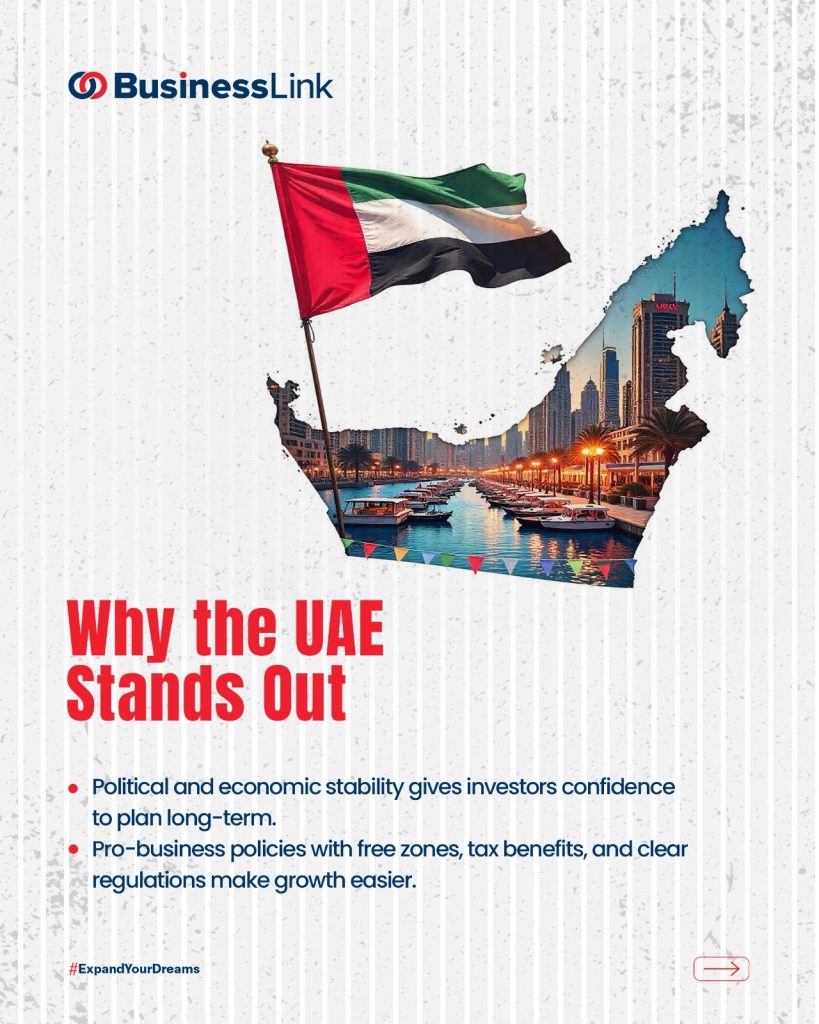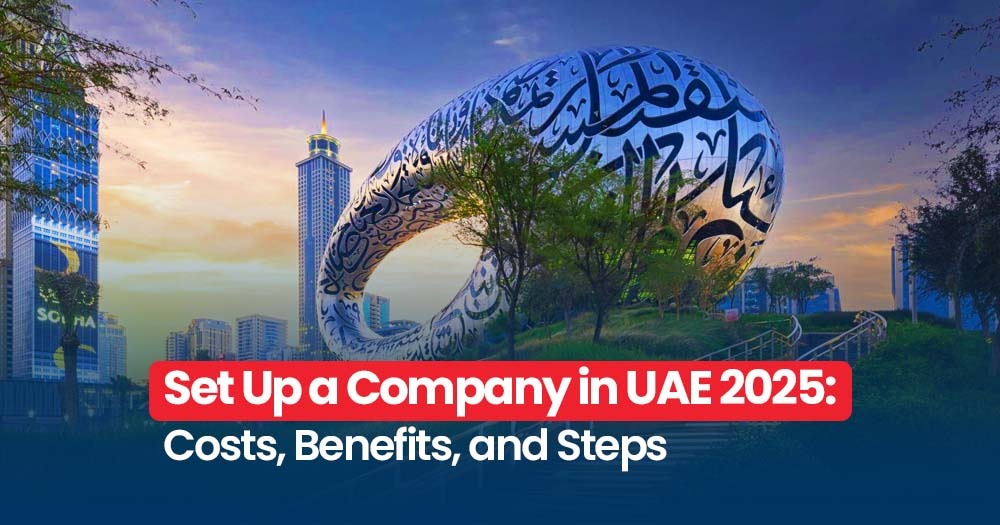Set up a company in the UAE in 2025 and start where opportunity meets stability. The country offers zero personal tax, fast registration, and full foreign ownership. Moreover, strong infrastructure and global trade access make it ideal for growth. Whether you plan a small startup or a large firm, the UAE provides smooth rules, digital systems, and investor support. So, why wait when success is one clear step away? To successfully set up a company in uae, understanding the local market is essential.
Table of Contents
Toggle- Why You Should Set Up a Company in the UAE: 7 Major Benefits
- What Licensing Options Exist in UAE for Different Business Activities?
- What Types Exist to Set Up a Company in the UAE?
- What Documents Are Required to Set Up a Company in the UAE?
- 9 Main Steps to Set Up a Company in the UAE (2025 Guide)
- UAE Company Setup Cost 2025: Free Zone, Mainland, and Offshore Guide
- How do I apply for a visa when setting up my company in the UAE?
- How long does it take to set up a company in the UAE?
- What Taxes Apply When You Set Up a Company in the UAE?
- Summary
- FAQ’s
Why You Should Set Up a Company in the UAE: 7 Major Benefits
Starting a business in the UAE in 2025 means entering one of the world’s most dynamic and secure markets. The country combines zero personal income tax, modern infrastructure, and global connectivity. Therefore, understanding these key benefits helps you make smarter business decisions before you set up a company in the UAE and realize your potential to set up a company in uae.
1. Financial Freedom and Low Tax Rates
- There is no personal income tax, and the corporate tax is capped at 9%, applied only to profits above AED 375,000.
- Consequently, startups and small firms often pay 0% corporate tax, which supports rapid growth and reinvestment.
2. 100% Foreign Ownership
- Since recent reforms, investors can fully own their businesses in most sectors.
- Hence, you no longer need a local sponsor.
- This gives you complete control over company decisions and profit distribution.
3. Strategic Global Location
- The UAE sits between Asia, Africa, and Europe.
- Therefore, it serves as a trade bridge to more than 3 billion people.
- Its world-class airports and ports ensure smooth import-export operations.
4. Full Profit Repatriation
- You can transfer all your profits and capital abroad without restrictions.
- Moreover, there are no currency limits, ensuring smooth international transactions.
5. Residency and Family Sponsorship
- Business owners can apply for residency visas and sponsor their families.
- Consequently, this makes long-term living and business management easier.
6. Fast and Simple Setup
- Free Zones and Mainland authorities now offer quick online registration.
- In many cases, company formation takes less than a week.
7. Stability and Safety
- The UAE ranks among the safest countries globally.
- Therefore, investors enjoy political stability and strong legal protection for businesses.
By understanding these benefits and planning ahead, you can set up your company smoothly, stay compliant, and grow confidently in the UAE’s blooming 2025 economy. Remember, to truly thrive, it’s vital to set up a company in uae that aligns with your business goals.

What Licensing Options Exist in UAE for Different Business Activities?
When you set up a company in the UAE, your first step is choosing the right license. Each license fits a specific activity and decides where and how your firm can operate. To navigate this process efficiently, it’s crucial to understand how to set up a company in uae based on your business needs.
Commercial License
- Commercial license For trading, import, or export.
- Works well for retail and online stores.
- Issued by the DED or Free Zone authorities.
- Commercial license, Allows you to trade inside or outside the UAE.
Professional License
- For services such as consultancy, design, or education.
- Gives 100 % foreign ownership in most emirates.
- Needs proof of skills or qualifications.
- Easy visa process for owners and staff.
Industrial License
- For manufacturing or assembly work.
- Requires a factory or warehouse.
- Needs approval from the Ministry of Industry and Advanced Technology.
- Offers customs and export benefits.
Tourism License
- For travel agencies, tour operators, or hotels.
- Controlled by the Department of Tourism and Commerce Marketing.
- Lets you arrange tours, events, and bookings.
Media and Creative License
- For advertising, PR, video, or content creation.
- Approved through media Free Zones such as Dubai Media City.
- Fits freelancers and production studios.
Healthcare License
- For clinics, labs, or telehealth centers.
- Requires DHA or DOH clearance.
- Ensures safe medical and pharmacy practice.
Food and Beverage License
- For restaurants, catering, and cloud kitchens.
- Needs food-safety and municipality checks.
- Allows delivery and event catering.
Freelancer Permit
- For solo workers in writing, design, or tech.
- Simple to get through Free Zones.
- Low cost and quick approval.
Agriculture and Fisheries License
- For farming or aquaculture.
- Needs MOCCAE approval and sustainability plans.
- Supports eco-friendly production.
Education and Training License
- For schools, academies, or online courses.
- Requires KHDA or ADEK approval.
- Ensures certified teachers and programs.
| License Type | Typical Activities | Main Authority |
| Commercial | Trading, import/export, e-commerce | DED / Free Zone |
| Professional | Consulting, design, healthcare, education | DED / Free Zone |
| Industrial | Manufacturing, assembly, packaging | MOIAT + DED / Zone |
| Tourism | Travel, tours, hotels | DTCM + Local Tourism |
| Media & Creative | PR, content, production | Media Free Zones |
| Healthcare | Clinics, labs, telehealth | DHA / DOH |
| Food & Beverage | Restaurants, catering | Municipality + Food Safety |
| Freelancer | Design, tech, consulting | Free Zone Permit |
| Agriculture & Fisheries | Farming, aquaculture | MOCCAE |
| Education & Training | Institutes, online courses | KHDA / ADEK |
Choose the license that fits your activity and market reach. Then apply through the right authority. With clear rules, simple steps, and early preparation, you can set up a company in the UAE quickly and start trading without delays.
What Types Exist to Set Up a Company in the UAE?
There are three main company types in the UAE: Mainland, Free Zone, and Offshore.
Each one fits a different goal, setup plan, and market reach.
1. Mainland Companies
- Mainland companies are licensed by the Department of Economic Development (DED) in each emirate.
- They let you trade freely across the UAE and work with government clients.
- Foreign investors can now own 100% of most business activities.
- However, you must rent a physical office in the UAE.
- You can also sponsor multiple visas, depending on your office size.
This option works best if you plan to sell directly in the UAE market or build a local branch.
2. Free Zone Companies
- Free Zones offer 100% foreign ownership and zero import or export taxes.
- There are over 40 Free Zones, including DMCC, JAFZA, and Dubai South.
- They give fast registration, low costs, and complete profit repatriation.
- Each zone focuses on certain industries such as trade, technology, or logistics.
- However, Free Zone firms cannot sell directly in the UAE market without a local agent.
If your business focuses on exports, digital services, or e-commerce, this is a smart choice.
3. Offshore Companies
- Offshore companies operate outside the UAE market but are registered under UAE law.
- They are usually formed in JAFZA Offshore, RAK ICC, or Ajman Offshore.
- These setups work best for asset holding, international trade, or intellectual property management.
- You don’t need an office or employees in the UAE.
- Offshore companies can still own property or hold shares in UAE Free Zone firms.
This type is ideal if you want a UAE legal base without local operations.
How to Choose the Right Company Type
- Before applying, define your business activity, target customers, and budget, and Choose a Mainland license for local trade.
- Pick a Free Zone license for international business.
- Select an Offshore structure for global asset management.
- By choosing carefully, you save time, reduce costs, and ensure fast approval.

What Documents Are Required to Set Up a Company in the UAE?
Starting a company in the UAE becomes smoother when your documents are correct and complete. The right paperwork speeds up approvals and protects you from costly mistakes. According to the UAE’s Department of Economy and Tourism, document errors are a main cause of rejected applications (source: invest.dubai.ae). Whether you’re setting up in the mainland or a free zone, accurate submission ensures faster licensing, fewer delays, and a successful business setup.
Mandatory Documents for UAE Company Formation
| Document | Purpose |
| Passport Copies | Verify identity of all shareholders and managers |
| Visa or Entry Stamp | Confirms legal stay for foreign nationals |
| Emirates ID | Required for UAE residents only |
| Trade Name Reservation Certificate | Confirms business name is approved and unique |
| Initial Approval Certificate | Shows your business activity is accepted |
| Memorandum of Association (MOA) | Outlines company structure and partner roles |
| Local Service Agent Agreement (LSA) | Needed for specific mainland activities |
| Lease Agreement (Ejari) | Confirms physical office or flexi-desk rental |
| Completed Application Form | Core company information, signed by owners |
| Specimen Signatures | Official signatures used in licensing and banking |
| Business Plan | Required for some sectors, especially in free zones |
| Bank Reference or Financial Reports | Shows financial capacity (if applicable) |
| Special Licenses or Permits | For regulated sectors (e.g., healthcare, education) |
Quick Notes for 2025 Setup
- Always use clear and updated copies, blurry scans get rejected.
- Make sure your passport has 6+ months of validity.
- Ejari or lease documents must be registered for mainland licences.
- Some free zones may waive business plans or financials for small startups.
Before you submit any visa application or licence request, confirm document requirements with the ICP, GDRFA, or the Department of Economic Development (DED). Rules may vary by emirate, activity, and business structure.
By preparing the right documents in advance, you’ll cut delays and stay fully compliant throughout your UAE business setup process.
9 Main Steps to Set Up a Company in the UAE (2025 Guide)
Starting a business in the UAE is easy if you follow the correct process. Over 55,000 new businesses were registered in Dubai alone in the first half of 2025 according To make your setup fast and cost-effective, here are the 9 steps you must take:
1. Define Your Business Activity
- Choose a specific activity. It determines your licence and allowed services. The UAE offers over 2,000 approved activities.
2. Choose the Legal Structure
- Pick from LLC, Free Zone Company, or Branch Office. Each has different benefits and limits.
3. Reserve a Trade Name
- Select a company name that follows UAE rules. Use official portals like Invest in Dubai or Abu Dhabi DED.
4. Apply for Initial Approval
- Get permission to proceed with your licence. This confirms your activity and structure are acceptable.
5. Pick a Business Location
- Lease an office, retail space, or flexi-desk. You must submit proof of your UAE business address.
6. Collect the Required Documents
- Prepare passport copies, tenancy contract, Emirates ID (if applicable), and approvals like MOA.
7. Apply for the Trade Licence
- Submit the application to the relevant authority (e.g. DET for Dubai). Then pay the required fees.
8. Open a Business Bank Account
- Choose a UAE bank based on your activity. You’ll need your licence and documents.
9. Complete the Visa Application
- Apply through ICP or GDRFA. This allows you to live in the UAE and sponsor staff if needed.
Always check with the relevant emirate authority for updated rules. By following these nine steps, you can legally set up your company in 2025, fast, simple, and with fewer delays.
UAE Company Setup Cost 2025: Free Zone, Mainland, and Offshore Guide
Starting a company in the UAE in 2025 remains one of the most rewarding investments, but costs differ depending on your setup type, Mainland, Free Zone, or Offshore. Each structure has unique benefits, visa options, and renewal fees. Understanding these differences helps you plan your budget, stay compliant, and grow confidently.
UAE Company Setup Costs Overview
| Setup Type | Starting Cost (AED) | Best For |
| Free Zone | ||
| SHAMS (Sharjah) | 5,750 | Media, marketing, and consultancy. |
| IFZA (Dubai) | 12,900 | Flexible Dubai setup with visa options. |
| Ajman Free Zone | 11,900 | Trading, service, and e-commerce. |
| Mainland | ||
| Ajman Mainland | ~22,000 (2 visas) | Access to UAE local markets. |
| Dubai Mainland (DED) | 25,000–45,000+ | Businesses that trade directly in the UAE. |
| Offshore | ||
| RAK ICC | 12,000–18,000 | Budget-friendly and fast setup. |
| JAFZA Offshore | 15,000–20,000 | Global reputation for trade. |
| Ajman Offshore | 13,000–17,000 | Simple and affordable registration. |
Main Factors Affecting Setup Costs
- Business Activity: Different activities have specific license fees. For example, manufacturing needs more approvals than consultancy.
- Jurisdiction: Mainland companies trade within the UAE, while Free Zones allow 100% ownership and tax benefits. Offshore setups are ideal for international holding companies.
- Company Structure: LLCs have higher registration costs, while sole establishments are faster and cheaper.
- Office Space: Mainland setups require physical offices. Free Zones provide flexi-desks from AED 7,000 per year. Offshore companies do not need office space.
- Visa Costs: Each residency visa ranges from AED 3,500 to 7,000. The number of visas allowed depends on office size.
- Government Fees: Include trade license, registration, and approvals.
- Consultancy Services: Using business setup consultants simplifies approvals but adds to the total cost.
Mainland Company Setup Cost Breakdown (Dubai Example)
| Category | Commercial License | Professional License |
| Trade License & Government Fees | AED 13,000–14,500 | AED 7,500–9,000 |
| Office Rent (Ejari incl.) | AED 15,000–25,000 | AED 15,000–25,000 |
| Investor Visa (1) | AED 4,000–5,000 | AED 4,000–5,000 |
| Total Cost | AED 32,000–44,000 | AED 26,000–39,000 |
Choosing an Arabic trade name can help you avoid the AED 2,000 foreign name charge.
Free Zone Setup Cost in the UAE
| Free Zone | License Cost | Office Options | Visa Quota |
| IFZA | AED 12,000–25,000 | Flexi-desk, private office | Custom |
| RAKEZ | From AED 5,699 | Warehouses, flexi-desks | Custom |
| Ajman Free Zone | From AED 5,555 | Shared offices | Custom |
| DMCC | AED 15,000+ | Private office | 3–6 visas |
| Meydan | AED 12,500–27,500 | Co-working | Up to 6 visas |
Free Zones are cost-effective for startups or digital firms aiming for global trade. They provide full ownership, zero import duties, and simplified registration.
Offshore Company Formation Costs in the UAE
Offshore companies are the most affordable choice for international investors who don’t need a UAE office but want to benefit from its tax-friendly system.
| Jurisdiction | Setup Cost (AED) | Renewal (AED) | Benefits |
| JAFZA Offshore | 15,000–20,000 | 12,000+ | Top-tier location and global credibility. |
| RAK ICC | 12,000–18,000 | 10,000+ | Fast, affordable, and ideal for asset holding. |
| Ajman Offshore | 13,000–17,000 | 10,000+ | Simple rules and low compliance. |
What’s Included
- Company registration and MOA
- Certificate of incorporation
- Registered agent and UAE address
- Assistance with business bank account
Offshore firms cannot apply for UAE residence visas. However, they can own assets, trade globally, and hold intellectual property rights.
Final Budget Planning Tips
- Always ask for a detailed cost breakdown; base packages often exclude visas and rent.
- Choose your jurisdiction based on your goals: Mainland for UAE trade, Free Zone for exports, Offshore for asset management.
- Include renewals and visa expenses in your yearly budget.
- Apply for a visa early to avoid delays and extra fees.
- Always use official portals like Invest in Dubai, GDRFA, or U.AE for the latest regulations.
UAE Company Setup Costs 2025: Free Zone, Mainland, Offshore
- Free Zone setups: AED 5,500–12,000 (best for startups and global operations).
- Mainland setups: AED 25,000–45,000 (best for local trade).
- Offshore setups: AED 12,000–18,000 (best for investors managing assets internationally).
By understanding these cost differences and planning ahead, you can start your company smoothly, stay compliant, and scale your business confidently in the UAE’s thriving 2025 market.
How do I apply for a visa when setting up my company in the UAE?
You can apply for your visa after getting your business licence. Start with registration, then complete your entry permit, medical check, Emirates ID, and visa stamping. Follow each step carefully to avoid delays.
- Choose your business zone. Mainland or Free Zone affects your visa type and process.
- Get your trade licence and office lease. Then you can sponsor yourself as an investor or partner.
- Create an account on the ICP or GDRFA website. Upload your passport, photo, and licence.
- Apply for an entry permit if you are outside the UAE. Inside the UAE, request a status change instead.
- After you enter, take your medical test at an approved health centre.
- Next, finish your biometrics and apply for your Emirates ID through the ICP portal.
- Submit your residence visa application under your company name. Pay the fees and attach all documents.
Receive your residence visa approval. Download your digital Emirates ID once approved. - If you meet requirements, you can later sponsor your family.
- Always renew on time to stay compliant and avoid penalties.
Visa Application Summary
| Step | Task | Where |
| 1 | Register company | DED or Free Zone |
| 2 | Apply for entry permit | ICP or GDRFA |
| 3 | Take medical test | Approved clinics |
| 4 | Enrol biometrics | ICP Smart Services |
| 5 | Get residence visa | ICP or GDRFA |
Tips for Smooth Approval
- Apply soon after your trade licence is ready.
- Use only official government portals.
- Keep all documents clear and up to date.
- Track your application online and save receipts.
These steps make it easy to set up a company and secure your visa in the UAE quickly.
How long does it take to set up a company in the UAE?
Setting up a company in the UAE is usually fast. Most businesses can start within days. Time depends on how ready your papers are. When documents are clear and approvals are quick, your setup moves faster.
- Free Zone setup: takes 3–7 working days if all papers are correct.
- Mainland setup: takes 7–21 working days, depending on the authority.
- Name reservation: takes 1–2 days; simple names get faster approval.
- Initial approval: usually 1–3 days; some business types take longer.
- Legal form signing: done the same day or online within 24 hours.
- Office lease or flexi-desk: takes 1–3 days for tenancy checks.
- Trade licence issue: 1–3 days after payment and Ejari upload.
- Bank account opening: 5–10 working days due to verification.
- Visa processing: 5–10 days after licence approval.
How to make the process faster?
- Prepare all documents early.
- Choose your licence and business activity in advance.
- Use Free Zones that offer online registration.
- Submit clear documents to avoid resubmission.
- Track your application daily through official portals.
- Pay all fees as soon as approval comes.
With proper planning, you can set up a company in less than a week. Short steps, clear papers, and fast responses save time and reduce delays.
What Taxes Apply When You Set Up a Company in the UAE?
The UAE offers a simple and business-friendly tax system. It helps companies save money and stay competitive.
- Corporate Tax: You pay 9% tax only if your profit is more than AED 375,000. Many small firms pay 0%.
- Free Zones: Most Free Zones offer full tax exemptions. Some give tax holidays up to 50 years.
- VAT (Value Added Tax): A 5% tax applies to most goods and services.
- Personal Income Tax: You pay 0%. The UAE does not charge income tax on individuals.
- Capital Gains Tax: Not applied. You can sell shares or assets with no tax.
- Withholding Tax: There is no tax on cross-border payments like interest or royalties.
Because the rules are clear, many global businesses choose the UAE. You should also keep accurate records. That way, you avoid fines and meet legal rules.
| Tax Type | Rate | Applies To |
| Corporate Tax | 9% (above AED 375,000) | Business profits |
| Free Zone Tax | 0% or holiday | Free Zone companies |
| VAT | 5% | Goods and services |
| Personal Income Tax | 0% | All individuals |
| Capital Gains Tax | 0% | Investments |
| Withholding Tax | 0% | Payments to other countries |
By maintaining proper books, filing returns on time, and consulting licensed tax advisors, you can maximize savings and avoid compliance risks.
Summary
If you plan to set up a company in the UAE, act now and secure your place in a fast-growing economy. The UAE offers full ownership, low taxes, and quick business registration. Moreover, Business LinkUAE simplifies every step, from trade license to visa processing, so you can start faster. With expert guidance and ongoing support, your success is within reach. Contact Business LinkUAE today and begin building your business the smart way.
Call our team today via phone at +97143215227, WhatsApp at +971502052735, or email at connect@businesslinkuae.com and get clear answers, expert advice, and hands-on help so you can attend your appointment fully prepared and confident.
FAQ’s
What are the top benefits of starting a business in the UAE?
Zero tax, 100% ownership, global access, fast setup, and residency opportunities.
How does zero income tax benefit UAE business owners?
It increases your profit margin and reduces operational costs, boosting long-term earnings.
Can foreigners own 100% of a company in the UAE?
Yes, most business types allow full foreign ownership in free zones and many mainland activities.
What does full profit repatriation mean for UAE investors?
You can transfer all business profits back to your home country without tax deductions.
How can setting up a company in the UAE help you get residency?
Business owners and investors can apply for UAE residency visas after company registration.
How long does it take to set up a company in the UAE?
Most setups take 3 to 10 business days, depending on the license type.
Is it safe to start and run a business in the UAE?
Yes, the UAE offers strong legal protection, political stability, and a pro-investor environment.




